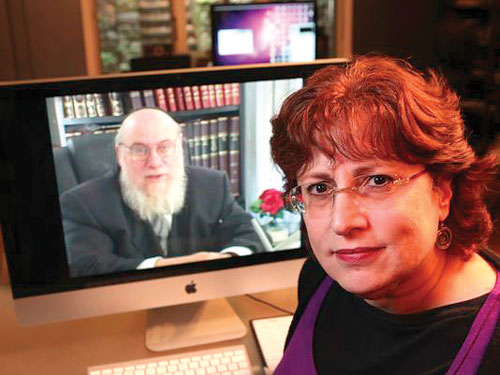.jpg)
My husband and I spent a recent work holiday doing what many Bergen County Jews did on that day off. We went to the movies. However, these weren’t just any movies. We were fortunate enough to be invited to visit the rustic Suffern home of Leta and Dave Lenik, filmmakers and founders of Better World Productions. There along with some of the filmmakers’ friends, we participated in a private screening and discussion of several of the Leniks’ powerful documentaries.
Leta and her husband Dave have produced and directed over 1200 films and video projects over a 35 year period. Some of Dave’s credits include Ridefilms, like the New York Skyride in the Empire State Building which uses 360 degree virtual environments. Yet, what attracted us on this blustery afternoon was this couple’s interest in Tikun Olam, their desire to better the world around them by creating documentaries that raise public interest about vital issues affecting the Jewish Community.
The first film viewed that afternoon, and the one that opened the Women and Religion Film Festival in Jerusalem in 2011, was Women Unchained, narrated by the actress Mayim Bialik. This film was written by Beverly Siegal and co-produced with Leta Lenik and was funded by the Agunah Project. It took close to eight years to complete and has won the approval of every facet of the Jewish Community The film documents the experiences of five modern day women who weren’t able to receive a get, a Jewish divorce, from their husbands, and therefore could not get on with their lives. It discusses the frustrations and pain experienced by these women and their families as well as the ineffectiveness of the various Rabbinical Courts that they approached for help.
Darryl and Michael Gillman of Chicago started the Agunah Project to raise awareness about nearly 500 women in North America who are not able to obtain a divorce. Their daughter Ariel, who is in the movie, was one of these women and it cost the Gillmans nearly a half-million dollars to free their daughter, blackmail referred to in the film as “get-onomics.” In a time when one in four marriages ends in divorce, it is important to note that there is little recourse for these women to influence a recalcitrant husband and too many are reduced to using bribery or actual thuggery to achieve their ends. After many interviews with the agunot and their families, prominent rabbis and women’s rights advocates, the film concludes with the suggestion that every young Jewish couple approaching marriage sign a strong halachic prenuptial agreement that does not challenge Jewish law, but advocates change and addresses ways to prevent this nightmare from occurring. The Get issue has repercussions for families through the generations and is therefore of concern to all Jews today no matter their affiliation.
Another of the films showcased that afternoon was Hungry to be Heard, a project produced by the Leniks for the Young Leadership Cabinet for the Orthodox Union to increase awareness about the problem of eating disorders in the Orthodox Jewish Community. As a former dancer, Leta Lenik is well aware of the pressures put on young people to be thin. The film discusses what the various types of eating disorders are and why young people fall into their trap. It teaches how to recognize the warning sign of the disorder and speaks about the long road to recovery by interviewing nutritionists, psychologists, families and friends of the afflicted.
Dave Lenik also discussed Monsieur, a film about the Holocaust, produced by Better World Productions as a project for Torah Umesorah. This video has been shown in many schools and synagogues on Yom Hashoah; detailing how even in those horrific times, there existed ordinary people who performed extraordinary feats. In this case he depicts the accomplishments of Rabbi Yonah Tiefenbrunner who established an orphanage in Belgium during World War II. There he miraculously was able to imbue hope and the pleasure of life into these children, forming the foundation for generations of happy families to come out of the ashes of the Holocaust.
While this sounds like an afternoon filled with gloom it was anything but that. Despite the films’ serious themes, they were made with insight, honesty and often humor to bring their messages across. We were so grateful to the Leniks for letting us catch but a glimpse of the important and creative work that they are doing for the Jewish community in order to make a world a better place in which to live. When we were leaving I asked Leta if she ever faced any criticism for occasionally showing the underside of Jewish Communal life. Her answer summed up all that she and Dave hope to accomplish by their work. “We don’t want to air the dirty laundry,” she said with a wry smile. “We want to wash the laundry.” May they continue for many years in their noble work.
The Leniks can be reached at Better World Productions
www.betterworldpro.com
By Estelle Glass










